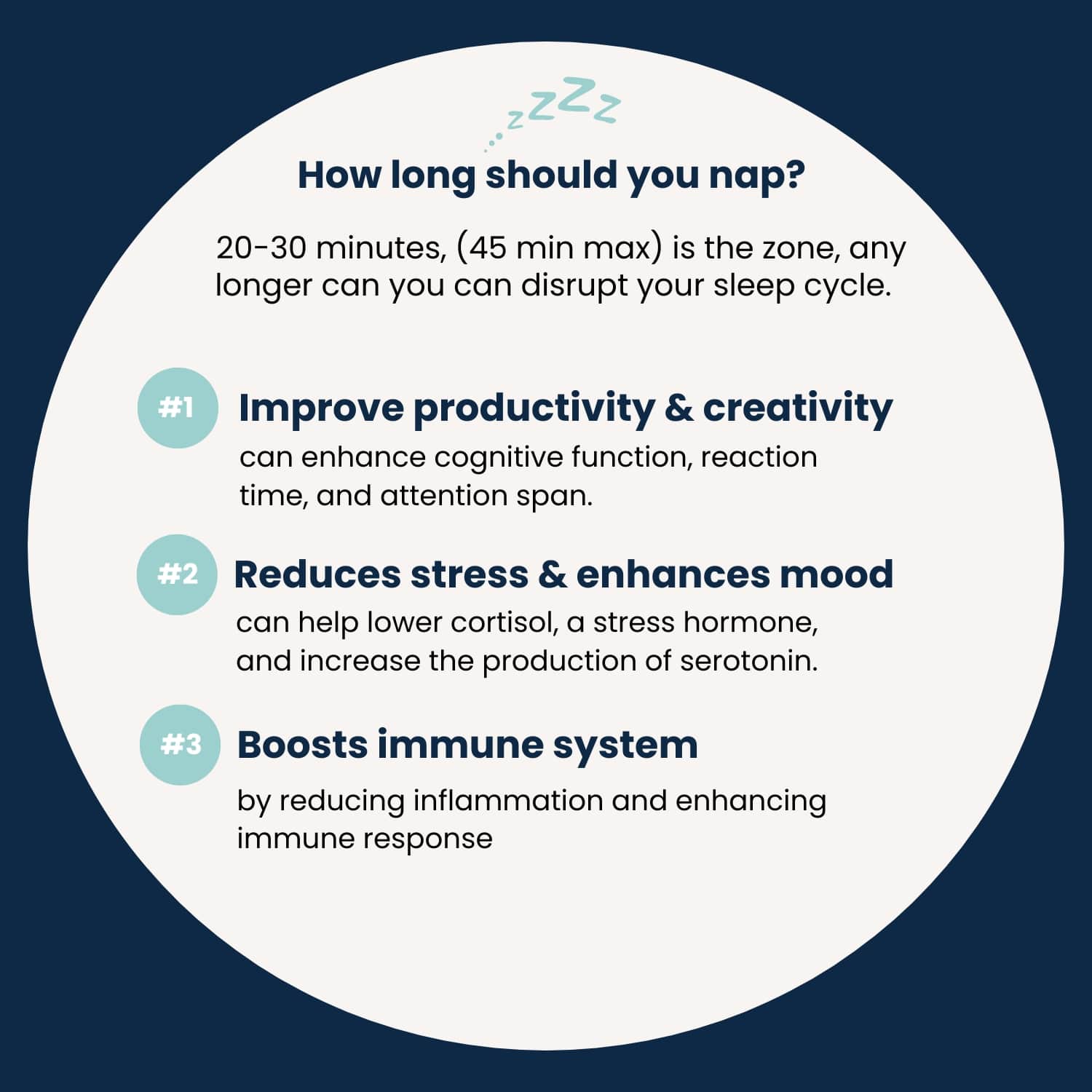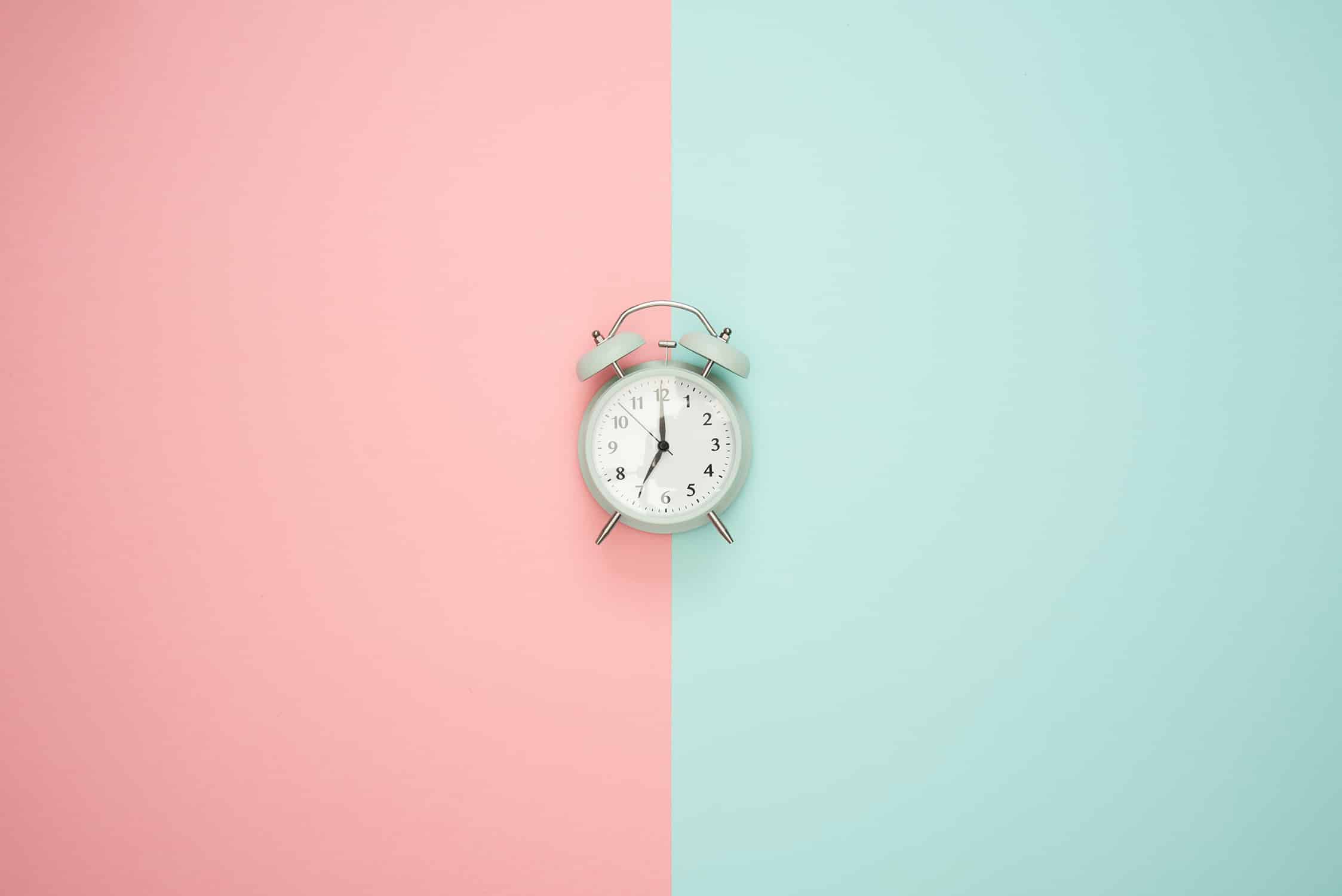Are you struggling to stay focused and energized throughout the workday? Do you find yourself reaching for that second (or third) cup of coffee just to make it through the afternoon slump? It's time to consider the power of power naps. Contrary to popular belief, taking a mid-day snooze isn't just for lazy people or children. Science has shown that short periods of rest during the day can actually improve your productivity, mood, and overall health. In this article, we'll explore how taking a power nap can benefit you and ways to incorporate this healthy habit into your daily routine.
What are power naps?
Power naps are short periods of rest during the day, typically lasting anywhere from 10 to 30 minutes. They have gained popularity in recent years as people begin to realize the benefits of this form of relaxation. Contrary to what some may believe, power naps are good for you and aren't just for lazy people or children – they're for everyone.
Research has shown that taking a power nap can improve productivity and boost mood and well-being. During our sleep cycles, our brains enter into a "consolidation" phase where we process information and memories from the day before. Napping during the workday allows our brains to take a break from processing new information, giving it time to consolidate all that we've learned so far – similar to defragging your computer. When we wake up from a power nap, we feel refreshed and ready to tackle the rest of our day with renewed energy.
If you're struggling with focus or feeling fatigued throughout your workday, incorporating a power nap into your daily routine could be just what you need.
It's an easy way to give yourself a quick boost without resorting to caffeine or other stimulants that could potentially harm your health in the long run. So why not give it a try? You might find that taking a mid-day snooze is exactly what you need to stay productive and energized throughout your day at work or home.

What does the science say about power naps and health?
Research has shown that power napping, often just 20-30 minutes of sleep during the day, can have significant benefits for health and productivity. One study found that people who regularly took daytime naps had lower blood pressure and lower rates of cardiovascular disease [^1^]. Additionally, another study showed that individuals who napped for less than half an hour experienced a boost in cognitive performance compared to those who had longer naps or did not nap at all [^2^]. These findings suggest that taking short periods of rest can improve physical and mental health outcomes.
Furthermore, power naps may also promote emotional regulation by reducing feelings of stress and anxiety. By providing a brief pause from our hectic daily schedules, power napping allows us to recharge both physically and mentally so we can perform optimally throughout the day.
However, it is important to note that excessive or long-term daytime sleeping may actually lead to negative consequences such sleep disorders such as insomnia or disruptions in circadian rhythms, sleep patterns, and can interrupt your deep sleep stage later in the night which can lead to poor sleep. Moderation and timing is key when incorporating power naps into your routine, but they can be a healthy means of increasing alertness and enhancing overall well-being.
What are the health benefits of power napping?
Dozing off mid-day may sound counterproductive, but it can actually do wonders for your health. Power napping has been proven to boost memory and creativity, improve reaction time, and even reduce stress. When you take a quick nap during the day, your body gets to rest and recharge without experiencing the grogginess associated with longer sleep sessions.
Yes! Power naps are good for you
In addition to its cognitive benefits, power napping has also been linked to lower risks of heart disease and lower blood pressure levels. Getting adequate rest during the day can help regulate hormones that control appetite and metabolism as well.

Excessive Daytime Sleepiness (EDS) Reduction:
-
Power naps help combat excessive daytime sleepiness, which can be caused by insufficient sleep, irregular sleep schedules, or sleep disorders. A short nap during the day can provide a quick energy boost, reducing drowsiness and promoting alertness.
Improved Cognitive Functioning:
-
Power naps have been shown to enhance cognitive performance, including memory, attention, concentration, and problem-solving skills. Taking a brief nap allows your brain to rest and recharge, leading to improved mental clarity and productivity.
Enhanced Immune System:
-
Sufficient sleep is crucial for a robust immune system. Power naps contribute to maintaining a healthy sleep schedule, ensuring you get adequate rest. Quality sleep supports the immune system's ability to fight off infections, reduce inflammation, and promote overall well-being.
Reduced Fatigue and Increased Energy:
-
Napping habitually, especially in the early afternoon, can help reduce fatigue and increase energy levels. It provides a temporary respite and allows the body to enter the restorative stage of sleep, promoting a balance in your circadian rhythm and rejuvenating your energy levels.
Heart Health and Lower Risk:
-
Studies have indicated that regular short naps may have a positive impact on heart health. Napping has been associated with lower blood pressure, reduced stress levels, and decreased risk of cardiovascular diseases, including heart attacks and strokes.
It's worth noting that while power naps offer numerous benefits, they should be taken in moderation and in a conducive sleep environment. Excessive napping or napping too close to bedtime can interfere with your regular sleep schedule and disrupt nighttime sleep. Finding the right balance and incorporating power naps strategically into your day can help optimize your health and productivity.
The best part? You don't need enough sleep for a whole hour or two just to feel refreshed - studies suggest that even just 20-30 minutes of shut-eye can give you an energy boost that lasts throughout the day.
If you're feeling lethargic in between tasks, fall asleep at night at work or find yourself nodding off every afternoon, consider taking short breaks for power naps instead of relying on caffeine-induced jolts. With all its incredible benefits for both mental health and physical well-being, there's no denying the power of a good nap!
Tips and tools to help your power nap
Power napping is a great way to boost your productivity light sleep and health. However, if you're new to this habit or just need some tips on how to make it even more effective, we've got you covered. Here are some of our top tools and techniques for taking the perfect power nap:
-
Find a quiet, comfortable spot: Choose a peaceful environment where you can rest undisturbed for 20-30 minutes, promoting relaxation and calmness.
-
Invest in eye masks or earplugs: Block out distractions like light and noise to ensure a more restful sleep experience.
-
Practice breathing exercises: Incorporate deep breathing exercises before your power nap to promote relaxation and faster transition into deep sleep mode.
By following these simple tips and utilizing tools such as eye masks, rem sleep techniques, and breathing exercises, you can seamlessly incorporate power napping into your daily routine and experience the rejuvenating benefits it offers.

How long should a power nap be?
So, how long should a power nap actually be? Experts recommend aiming for 20-30 minutes of shut-eye to reap the benefits without feeling groggy or disrupting your nighttime and sleep cycle.
This is because a nap that lasts longer than 30 minutes can send your body into deeper stages of sleep, making it harder to wake up and causing you to feel even more tired. Additionally, shorter naps help avoid the sluggishness that can come with sleeping for an extended period during daylight hours.
The timing of your nap also plays a role in its effectiveness. The optimal time for a short nap for most people is between 1 pm and 3 pm when energy levels naturally dip after lunch. However, if you work evening or night shifts, adjust accordingly so that you're able to get some rest during your natural downtime.
Overall, the key is finding what works best for your individual needs and sticking with it consistently - over time, incorporating power naps into your routine could lead to significant improvements in mental clarity and well-being at work!
Power nap time hack: Adding Caffeine!

Drinking coffee before a power nap can offer several advantages when it comes to boosting your energy levels and enhancing cognitive performance. The combination of caffeine and a short nap can create a synergistic effect that helps you wake up feeling refreshed and revitalized. Coffee contains caffeine, a stimulant that can block adenosine receptors in the brain, reducing feelings of fatigue and promoting alertness.
When you consume coffee just before a power nap, it takes approximately 20-30 minutes for caffeine to enter your bloodstream and start exerting its effects.
Meanwhile, during your nap, your brain goes through various stages of sleep, including light sleep and non-rapid eye movement (NREM) sleep. By the time you wake up from your nap, the caffeine will have kicked in, providing an additional energy boost.
This combination can lead to improved focus, increased productivity, and reduced feelings of drowsiness, making it an effective strategy for combating fatigue during the day.
However, it's essential to note that individual responses to caffeine may vary, and consuming coffee close to bedtime may interfere with nighttime sleep. It's important to find the right balance and consider personal tolerance levels to caffeine.


Will a power nap disrupt your sleep at night?
Many people worry that taking a power nap during the day could disrupt their sleep at night. However, studies have shown that when done properly, daytime napping can actually improve nighttime sleep quality. The key is to limit naps to no more than 30 minutes and avoid napping too close to bedtime.
When you take a nap for an extended period of time or too close to bedtime, it can lead to difficulty falling asleep or staying asleep at night. This is because your body may not be as tired as it should be to fall asleep at your regular bedtime due to the extra rest during the day.
However, when kept short and timed appropriately, power naps can provide a boost in energy without negatively impacting your nighttime sleep habits.
Overall, incorporating a short mid-day, nap time into your routine may even improve overall health by reducing stress levels and improving cognitive function – making you happier and more productive throughout the workday!
Sources:
[^1^]: [Study on power napping and cardiovascular health]
(https://www.ncbi.nlm.nih.gov/pmc/articles/PMC4667384/)
[^2^]: [Research on cognitive performance, sleep deprivation and power napping](https://www.ncbi.nlm.nih.gov/pmc/articles/PMC2656292/)


















Leave a comment
This site is protected by hCaptcha and the hCaptcha Privacy Policy and Terms of Service apply.